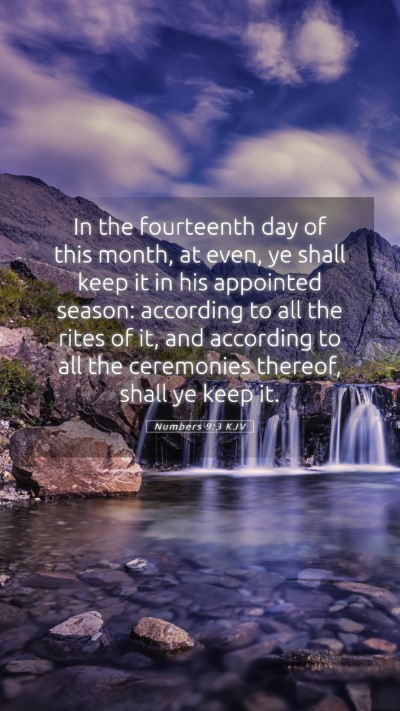Understanding Numbers 9:3
The verse Numbers 9:3 states: "In the fourteenth day of this month, at evening, you shall keep it in its appointed season: according to all the rites of it, and according to all the ceremonies thereof, shall you keep it." This verse is packed with meaning and resonates with themes of obedience, remembrance, and the significance of ritual in worship.
Bible Verse Meanings
Understanding this verse requires an exploration of its context within the Book of Numbers and the broader narrative of the Israelites' journey. It emphasizes the necessity of observance of specific rituals as set forth by God, particularly relating to the Passover.
Primary Themes
- Obedience to God's Command: This verse highlights the importance of adhering to God’s directives regarding the observance of sacred traditions.
- Remembrance: The keeping of the Passover is a crucial act of remembrance for the Israelites, signifying their deliverance from slavery in Egypt.
- Communal Worship: Emphasizes the collective nature of worship, showing that these acts are meant to be performed together as a community.
Bible Verse Interpretations
In examining Numbers 9:3 through various commentaries, we can derive a deeper understanding:
- Matthew Henry: Henry elaborates that this command was given to ensure that the Israelites would have a poignant and organized way to remember their liberation, signifying that spiritual observances are not to be taken lightly.
- Albert Barnes: Barnes notes that the timing and manner of the observance serve to instill discipline and order among the people, highlighting the significance of adherence to God’s covenant.
- Adam Clarke: Clarke emphasizes that such instructions illustrate the continuous need for the people to remain focused on their identity as those chosen by God, fostering a sense of community and collective memory.
In-depth Bible Verse Analysis
The command to keep the Passover on the fourteenth day of the month is filled with historical and spiritual significance. The following aspects are central to our biblical exegesis:
- Historical Context: The Israelites were instructed to remember their deliverance from Egypt, a foundational event in their identity as a nation.
- Liturgical Symbolism: The rituals associated with Passover foreshadow larger themes of sacrifice, redemption, and communion with God, which find resonance in New Testament teachings.
- Application to Daily Life: This verse encourages believers to observe and celebrate God's faithfulness in their own lives, recognizing the importance of remembrance in their faith journey.
Bible Study Insights
When studying Numbers 9:3, one might consider the following insights for personal or group study:
- Exploring the significance of rites and ceremonies in fostering community bonds and spiritual identity.
- Reflecting on how current practices of remembrance, such as communion, mirror the Passover observance.
- Discussing the relevance of obedience to God's commands in contemporary faith practices.
Cross References
This verse is related to several other scriptures that reinforce its teachings:
- Exodus 12:6: Discusses the timing of the Passover lamb being kept until the evening of the fourteenth day.
- Leviticus 23:5: Provides details about appointed feasts of the Lord, including Passover.
- Deuteronomy 16:1: Offers further instructions on observing Passover and the significance of the month of Abib.
Conclusion
In summary, Numbers 9:3 serves not only as an instruction for ancient Israel but also provides profound insights into obedience, remembrance, and community worship that apply to believers today. As one engages with this scripture, it invites deeper exploration into the meaning of Bible verses and the importance of maintaining the cultural and spiritual heritage through ritual observance.


